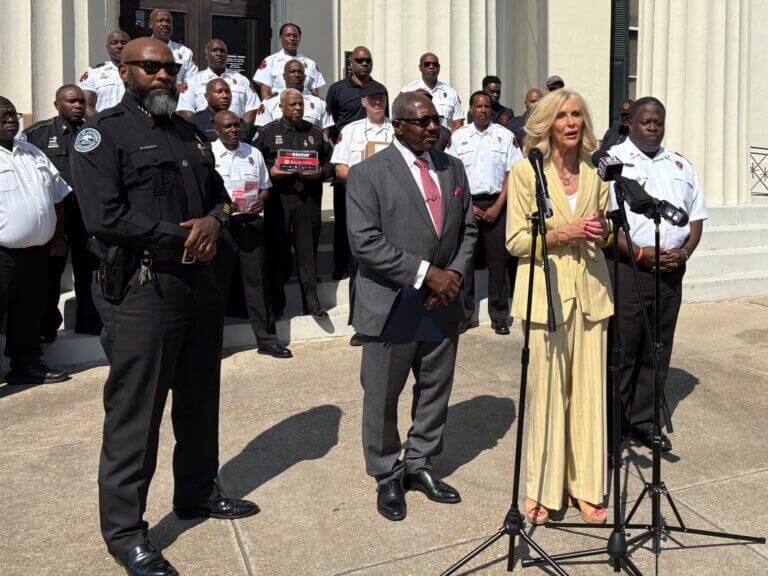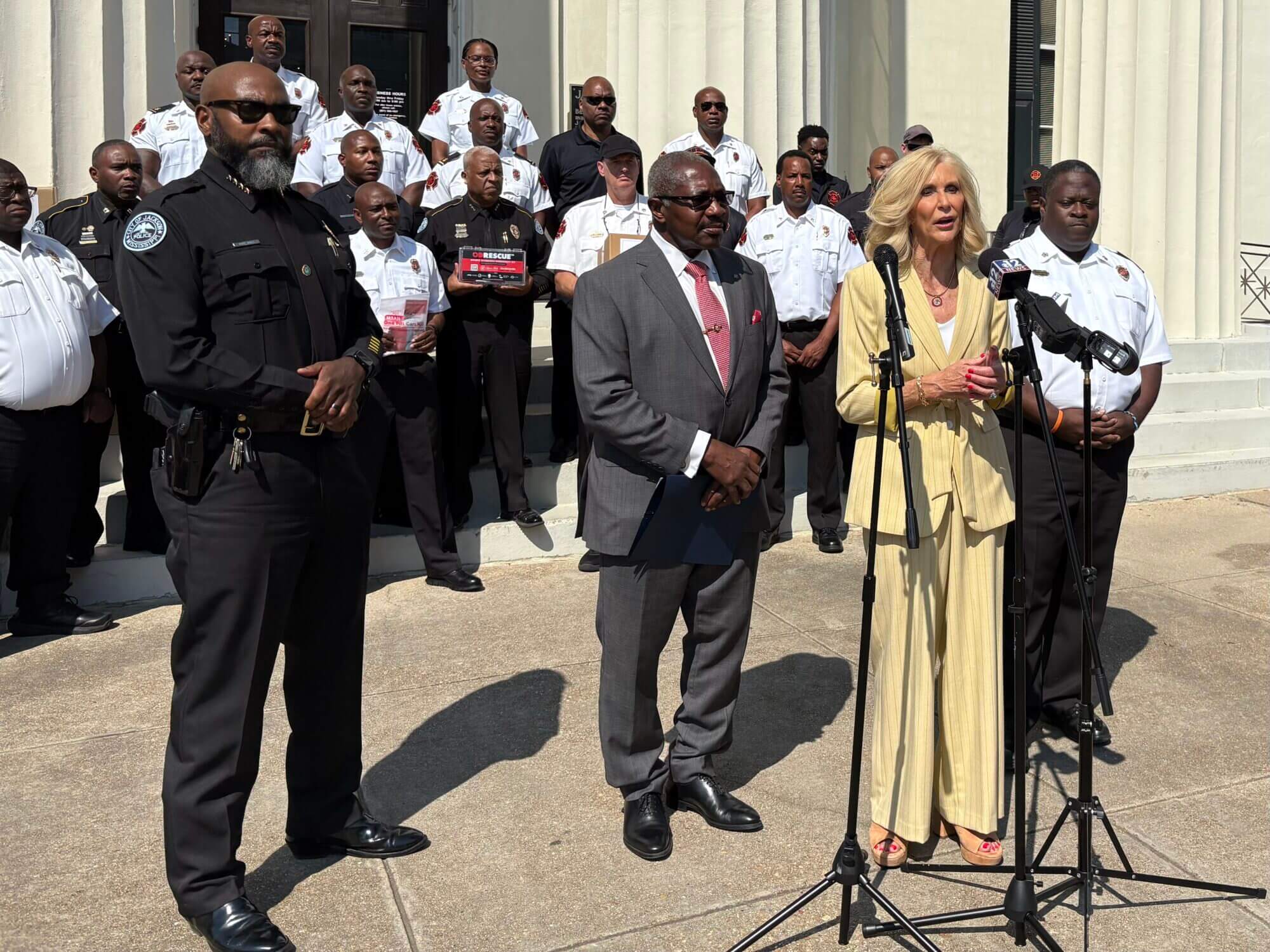

Mississippi Attorney General Lynn Fitch and Jackson Mayor John Horhn signaled the state’s local opioid settlement dollars could continue to mostly be spent for purposes unrelated to addiction as they touted the importance of doing everything possible to address the fentanyl crisis.
Horhn and Fitch held a joint press conference Monday morning in front of Jackson city hall to highlight that the city’s fire and police stations would now be stocked with the opioid overdose-reversing medication naloxone. It’s part of Fitch’s “One Pill Can Kill” campaign, a public awareness effort not funded by opioid settlement money to prevent fatal fentanyl overdoses.
Horhn spoke about the urgent need to prevent overdoses as he, Fitch, Interim Jackson Police Chief Tyree Jones and Interim Fire Chief Rasean Thomas stood in front of media microphones.
“Anything we can do to help mitigate the dangers posed by fentanyl use is a good thing,” Horhn told reporters.
Fitch echoed that message in her address.
“We see that there’s a crisis,” she said as Jackson first responders stood behind her holding boxes of naloxone. “We know what to do because we’re trained on this. We have the resources, the tools and the supplies.”
But neither said they would advocate that the lawsuit funds sent to cities and counties – paid by companies that contributed to the opioid crisis that has killed at least 1,300 Mississippians since the state received its first payment three years ago – be spent to mitigate those same dangers. The state has received over $124 million in lawsuit payments in the past three years, but less than $1 million has been used to address addiction so far.
Both the state and localities are expected to receive about $300 million more over the next 20 years.
Horhn — whose city has been spending a portion of its more than $500,000 of opioid settlement dollars for fiber optic cable installation, an office move and a shelving system — said he expects future payments to be used for the city’s violence prevention efforts. Chokwe Lumumba, Horhn’s predecessor, was mayor when Jackson spent money for general expenses.
Horhn said he and the city council might use some settlement dollars to prevent more overdoses, but he didn’t make any commitments to that.
“We also realize that we’ve got a serious violence prevention need in our city, and that’s an allowable expense,” he told reporters. “And so right now, that’s where we’re going to put the primary focus.”
When Mississippi Today asked Fitch if the state has done enough with opioid settlement money to prevent overdoses, Fitch said she was following the Legislature’s instructions and reviewing applications for overdose response projects with the Mississippi Opioid Settlement Fund Advisory Council. It’s a committee created by state lawmakers this year and chaired by Fitch to recommend how the Legislature should spend most of the state’s opioid settlement dollars.
“We’re getting people to vet those [applications] so we can make the distributions and the recommendations to the Legislature,” she said.
Lawmakers then decide which of those applications to accept or reject, and they expect to distribute those dollars in the summer of 2026.

Mississippi Today asked Fitch why Mississippi is the only state in the country to distribute less than $3 million of its opioid settlement funds to address addiction after the conference ended. Her spokesperson, Maryasa Lee, interrupted before Fitch could respond.
Lee said it was the Mississippi Today reporter’s third question at the event, and the attorney general’s office had already emailed the newsroom a statement about the spending. The statement did not address that question.
Most of Mississippi’s opioid settlement money is overseen by state government leaders, but they’ve only reported using their tens of millions of dollars for lawyers fees so far. The $15.5 million that cities and counties like Jackson have received can be spent on general expenses because Fitch wrote a contract in 2021 that says Mississippi’s local governments – unlike in at least 34 other states – can spend opioid settlement payments for any public purpose.
Those localities have reported using less than $1 million of that money to address the crisis, a Mississippi Today investigation found.
The lawsuits’ lawyers said that some spending unrelated to addiction is allowed, but they discouraged governments receiving the money from doing that. Most states required all their opioid settlement money to be spent to address addiction, and they’ve all spent more for that purpose than Mississippi — both in total dollars and as a percentage of settlement shares.
Mississippians struggling with opioid addiction face challenges when looking for treatment and recovery resources, even as the state has received these payments. Less than a third of people in the state who have an opioid addiction and use Medicaid, a federal-state health insurance program, received effective medication to treat the disease, according to a 2023 study.
When Mississippi Today showed public health advocates how the state’s cities and counties are spending their opioid settlement dollars, they were dismayed. Dr. Judith Feinberg, who helped author a guide on how the money could address the public health crisis, called Mississippi’s settlement spending “complete and utter bullshit.”
The state’s opioid settlement advisory council closed its call for applications on Friday, and it’s expected to make recommendations to the Legislature in December.
- Sen. Wicker writes to Kristi Noem opposing feared ‘ICE warehouse’ in Byhalia - February 4, 2026
- House votes to legalize online sports betting and divert $600M to pension system - February 4, 2026
- Lawmakers push bills to heighten transparency for rural health federal funding - February 4, 2026